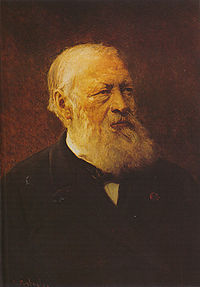Hendrik Conscience
| Hendrik Conscience | |
|---|---|

Conscience, painted in 1870, by Jean Portaels
|
|
| Born |
3 December 1812 Antwerp, French Empire (modern Belgium) |
| Died | 10 August 1883 (aged 70) Elsene, Brussels, Belgium |
| Resting place | Schoonselhof cemetery, Antwerp |
| Occupation | Soldier, revolutionary, writer, poet, novelist |
| Literary movement | Romanticism |
| Notable works | Flemish Life in Four Stories, Ludovic and Gertrude, The Young Doctor, The Amulet, De Leeuw van Vlaenderen |
Henri or Hendrik Conscience (3 December 1812 – 10 September 1883) was a Belgian author. He is considered the pioneer of Dutch-language literature in Flanders, writing at a time when Belgium was dominated by the French language among the upper classes, in literature and government. Conscience fought as a Belgian revolutionary in 1830 and was a notable writer in the Romanticist style popular in the early 19th century. He is best known for his romantic nationalist novel, De Leeuw van Vlaenderen (1838), inspired by the victory of a Flemish peasant militia over French knights at the 1302 Battle of the Golden Spurs during the Franco-Flemish War.
Over the course of his career, he published over 100 novels and novellas and achieved considerable popularity. After his death, with the decline of romanticism, his works became less fashionable but are still considered as classics of Flemish literature.
Hendrik was the son of a Frenchman, Pierre Conscience, from Besançon, who had been chef de timonerie in the navy of Napoleon Bonaparte, and who was appointed under-harbourmaster at Antwerp in 1811, when that city formed part of France. Hendrik's mother was a Fleming, Cornelia Balieu, and was illiterate. When, in 1815, the French abandoned Antwerp after the Congress of Vienna, Pierre Conscience stayed behind. He was an eccentric and he took up the business of buying and breaking-up worn-out vessels, which the port of Antwerp was full of after the peace.
The child grew up in an old shop stocked with marine stores, to which the father afterwards added a collection of unsellable books; among them were old romances which inflamed the fancy of the child. His mother died in 1820, and the boy and his younger brother had no companion other than their grim and somewhat sinister father. In 1826 Pierre Conscience married again, this time a widow much younger than himself, Anna Catherina Bogaerts.
...
Wikipedia
